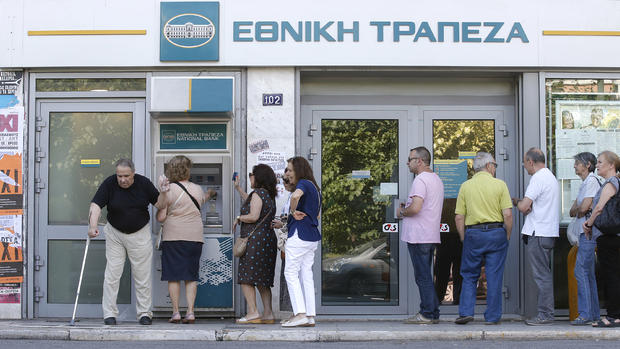Greece defaults on IMF loan as bailout expires
Greece has defaulted on its debt five times since the 1820s, and the clock is ticking down to number six, raising anxiety around the world. But it's a situation some economists say could have been avoided had some of Greece's debt been forgiven when its economy began to crumble in 2010.
In a research paper published earlier this year, Princeton University economist Ashoka Mody raised the question: "Why was more debt not forgiven earlier? No one is willing to confront that unpleasant arithmetic, and wishful thinking prevails."
The failure to reckon with Greece's debt crisis played out this afternoon when the International Monetary Fund officially announced that the country's government had missed a 1.6 billion euro ($1.8 billion) payment that was due to the lender today.
"We have informed our Executive Board that Greece is now in arrears and can only receive IMF financing once the arrears are cleared," IMF spokesman Gerry Rice said in a statement after U.S. financial markets closed on Tuesday.
Greece's broader bailout package also expires today.
Earlier in the day, Greek Prime Minister Alexis Tsipras had requested a new financial lifeline from its eurozone neighbors that would cover 29.15 billion euros ($32.52 billion) in debt payments between 2015 and 2017. Reaction among European officials was skeptical because it wasn't clear what concessions Tsipras was offering ahead of this weekend's referendum in Greece on the bailout package.
Greek citizens are already feeling the pain of capital controls that have closed the nation's banks and caused business activity to grind to a halt. Credit conditions are unlikely to improve anytime soon regardless of when the debt crisis is resolved, economists say.
"I consider capital controls already in place to be akin to exit," wrote Anil Kashyap, a professor of economics and business at the University of Chicago's Booth School of Business, in an email to CBS MoneyWatch. "If I were advising the Greeks, I would not reintroduce the drachma, instead would use IOUs and keep saying that someday I'll lift the capital controls and fully return to the euro."
Restructuring Greece's debt would cost the country's public and private creditors 140 billion euros ($156 billion), about half the 239 billion euros ($266 billion) they would be saddled with if the cash-strapped country is forced out of the eurozone, according to a report released today by RBS.
If Greece drops the euro, the value of any new currency would be about 40 percent less than its current one. The "contagion" could spread to other countries such as Italy, Spain and Portugal, which would see their borrowing costs increase by about 1 percent for the remainder of 2015 and 2016.
Many economists have argued for years that Greece can't afford its debt. "Greek debt is unsustainable in the long run," Alberto Gallo, an economist with RBS, said. "Restructuring makes sense. Debt forgiveness is not on the table and wouldn't be the right solution here."
Greece has a long history of economic turbulence. Throughout the 1990s, the country spent more money than it collected in taxes. A threat of default emerged in 2010. The rescue approved by European politicians came from the region's governments and the International Monetary Fund, and was used to pay off Greece's private creditors, mostly banks in Germany and France.
A 2010 report by the IMF concluded that if the Greek government undertook drastic reforms, the country's debt would become manageable. Later, the IMF found that the analysis was "deeply flawed." Many economists have argued for debt relief for Greece. That never happened, but the county continues to demand it today.
Kashyap said he wasn't sure what difference it would have made if Greece's debt had been reduced at the time, although he argues that the country would be in better shape than it is now. Still, economists note that structural changes need to be made.
"Other countries might have demanded the same concessions and the eurosystem did not have the same infrastructure in place that exists now, so things would have been messy," Kashyap said. "But it was clear in 2010 that Greece would never be able to pay and that the IMF forecasts that justified the new lending was bogus."
